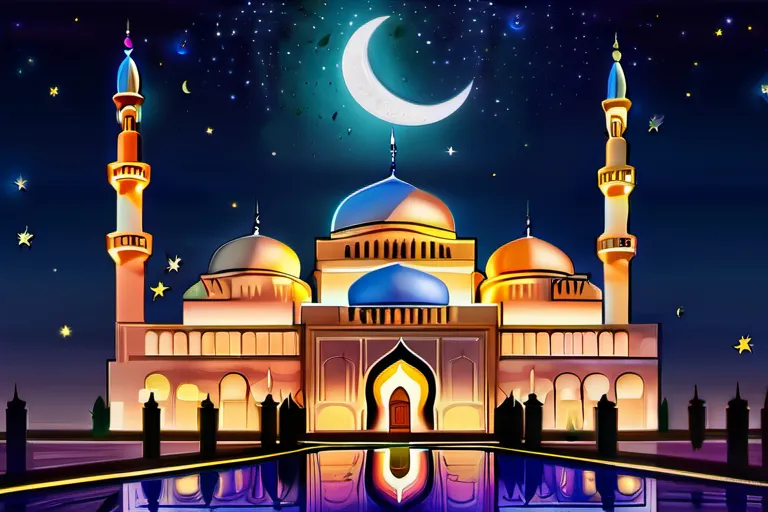Exploring the Holy Month of Fasting, Spiritual Growth, and Charity
Ramadan is a sacred month for Muslims worldwide. In this comprehensive guide, we delve deep into the significance, practices, and traditions of Ramadan to offer valuable insights into one of Islam’s most cherished observances.
The Meaning and Significance of Ramadan
The month of Ramadan, as if it were a grand symphony, begins to unfold each year, captivating the hearts and minds of millions across the globe. But what exactly is this holy month in Islam? How does it differ from other months in the lunar calendar? Is Ramadan just about abstaining from food and drink?
Indeed, fasting during Ramadan is one of its most recognizable practices, but the significance extends far beyond the physical act. Imagine a journey where each day brings not only spiritual cleansing but also a deepening understanding of thikr, or remembrance of Allah. This month invites Muslims to reflect on their deeds and intentions, to seek forgiveness, and to strengthen their connection with the divine.
Ramadan is more than just abstaining from food and drink between sunrise and sunset; it’s a time when good intentions and acts of charity can have multiplied blessings. The act of breaking one’s fast (iftar) becomes a moment of celebration and gratitude, often shared with family and friends in the spirit of Iftar feasts. This practice mirrors how every small gesture during Ramadan has the potential to ripple outward, bringing light and warmth wherever it goes.
The significance of Ramadan is deeply rooted in its origins, traced back to when the Quran was first revealed to Prophet Muhammad (peace be upon him). It’s a month marked by divine revelations, spiritual rejuvenation, and an opportunity for all Muslims to seek nearness to Allah. In essence, isn’t Ramadan like a mirror reflecting our true selves?
So as we prepare ourselves for this sacred month, let us embrace its teachings not just in the days of fasting but throughout our lives. For in the act of giving up and giving back, we discover the true essence of Islam: love, mercy, and compassion.
Fasting During Ramadan: Rules and Guidelines
When discussing Ramadan, one can’t help but ponder why such a practice as fasting holds such profound significance in Islam. Fasting during Ramadan isn’t just about abstaining from food and drink; it’s a journey towards spiritual purification and self-discipline. Imagine fasting as a personal voyage through the desert of life—where every act of forbearance is like finding a precious oasis, and each moment of hunger serves as a reminder to stay focused on what truly matters.
The rules and guidelines for fasting during Ramadan are meticulously designed to challenge and refine believers. It’s not merely about avoiding food from dawn until sunset; it’s also about abstaining from anything that could harm one’s spiritual health, such as lying, backbiting, or sinful thoughts. These rules serve as a guide, ensuring that the act of fasting is both physically and spiritually rewarding.
There are certain do’s and don’ts during this holy month that Muslims must follow to maintain the integrity of their fast. One must wake up early for suhoor (the pre-dawn meal) and break the fast at iftar with sincerity and gratitude. The don’ts, on the other hand, include consuming food or drink while fasting, engaging in sexual intercourse during daylight hours, or partaking in any form of wrongdoing. These guidelines are essential to ensure that the act remains a spiritual practice rather than just a physical one.
It’s worth noting that there are exceptions for those who find it difficult to fast due to health conditions, travel, or other valid reasons. For them, making up missed days later in the year is encouraged as a way of fulfilling their religious obligations without breaking the spirit of Ramadan.
The benefits of fasting during Ramadan extend far beyond just spiritual growth. It’s a period where individuals can experience firsthand what it means to empathize with those less fortunate and appreciate every morsel they eat. This practice fosters discipline, patience, and resilience—qualities that are invaluable not only in religious contexts but also in everyday life.
So, as we delve into the specifics of fasting during Ramadan, let us remember the profound lessons it offers. Each fast is a step towards greater self-awareness and spiritual enlightenment, reminding us of our duties and responsibilities toward both God and humanity.
The Nightly Taraweeh Prayers
As Ramadan unfolds, it’s not just about fasting from dawn till dusk; it’s also about engaging in nightly Taraweeh prayers that are deeply rooted in the practices of our beloved Prophet Muhammad (PBUH). These prayers hold a special significance during the holy month and are often shrouded in a sense of mystery and reverence. What exactly do these Taraweeh prayers entail, and why are they so important?
Taraweeh prayers are held every night of Ramadan except for the last ten days. They consist of optional prayers that were performed by the Prophet (PBUH) to seek closeness to Allah. The structure is simple yet profound; each prayer session can range from 8 to 20 rakats, depending on which school of thought one follows. Imagine a sea of worshippers, their hearts pounding in unison as they bow and prostrate, seeking forgiveness and divine blessings.
The etiquette surrounding these prayers is also worth noting. Muslims are encouraged to be punctual, dress modestly, and recite the Quran with deep reflection. It’s a time for spiritual growth, but it requires discipline and sincerity. How many times have we heard, ‘Can I really stay up late just to pray?’ The answer often lies in the profound impact these prayers can have on one’s soul.
Partaking in Taraweeh prayers is like embarking on a personal journey of spiritual exploration. It’s not merely about praying; it’s about deepening your connection with Allah and reflecting on the blessings you receive every day. By participating, we not only seek nearness to our Creator but also gain a better understanding of ourselves and our faith.
So why do these prayers hold such significance? They serve as a reminder that Ramadan is more than just about abstaining from food and drink; it’s a comprehensive journey towards spiritual purity. Engaging in Taraweeh prayers during this holy month can transform your experience, turning the nights into opportunities for greater closeness with Allah.
Every rakat offers a chance to connect, to learn, and to grow. As you enter these nightly sessions, remember that each prayer is a step towards spiritual elevation. It’s a moment of introspection and reflection, where the boundaries between you and your Creator become thinner. Embrace this tradition with open hearts and minds, for it can change not just the month but your entire life.
Charity During Ramadan: Zakat and Lailatul-Qadr
Imagine you’re walking along a winding path, surrounded by towering peaks and lush green valleys. Each step brings new challenges but also deeper insights. Ramadan, in many ways, is like this journey. It’s a time when Muslims fast from dawn until sunset, abstaining not just from food and drink, but also from harmful speech and actions.
So, what is Ramadan? It’s more than just a month of fasting; it’s an opportunity for spiritual renewal and self-reflection. But why does this month hold such significance in Islam?
In Ramadan, Muslims believe that the first verses of the Quran were revealed to Prophet Muhammad (peace be upon him). This makes Ramadan a period of profound spiritual enlightenment. It’s as if a light bulb suddenly illuminates a dark room, guiding us towards understanding and truth.
One of the most significant aspects of Ramadan is Zakat, the act of giving alms to the needy. Think of it like pouring water from a full cup into an empty one; it enriches both the giver and the receiver. Zakat reminds us that our wealth isn’t just ours but a trust from Allah, to be used for good in this world.
But there’s another powerful night during Ramadan—the Lailatul-Qadr. It’s often described as the Night of Power, when angels descend with blessings. Some even say it can hold the value of 1000 months. During this night, Muslims seek forgiveness and ask for special favors from Allah. It’s like a golden opportunity, hidden in the dark sky, waiting to be discovered.
Both Zakat and Lailatul-Qadr embody the essence of Ramadan: giving back and seeking grace. They remind us that our actions matter, not just on this earth but also beyond it. So, as we navigate through the fasting days of Ramadan, let’s remember the profound impact of charity and seek to make every moment count.
Ramadan Traditions and Celebrations
Imagine a month where each day is like a new page in a sacred book, filled with opportunities for spiritual renewal and self-discipline. That’s what Ramadan is—a time when Muslims around the world embark on a journey of fasting from dawn until sunset. But Ramadan isn’t just about abstaining from food; it’s a comprehensive experience that encompasses traditions, celebrations, and communal bonds.
One of the first things to explore during this holy month is Suhoor, the pre-dawn meal that marks the start of the fast. It’s like packing your backpack with all the energy you need for an epic journey—both physically and spiritually. Many Muslims prepare their Suhoor with care, ensuring they have enough sustenance to keep them going until sunset. The act of sharing this meal often brings families together in a small yet powerful moment.
As the day progresses and the sun begins its descent, Muslims break their fast with Iftar. This meal is not just about eating; it’s a celebration that starts with the breaking of bread. Think of Iftar as the final chapter in a story—every bite represents a new beginning, filled with hope and gratitude. It’s customary to share Iftar with family and friends, fostering a sense of community and brotherhood.
The joy of Ramadan isn’t confined within its walls but extends into the broader society through Eid al-Fitr. This festival marks the end of Ramadan and is celebrated with vibrant colors, delicious sweets, and heartfelt greetings. It’s like the climax of a grand opera—every note played out with an incredible harmony. People dress in their finest clothes and gather to pray, sharing blessings and spreading happiness.
Each tradition during Ramadan serves as a reminder of its profound significance. From the early morning Suhoor to the communal Iftar, every aspect is intertwined with deep spiritual meaning. By participating in these rituals, Muslims not only strengthen their faith but also deepen their connections with one another. It’s a month that transforms not just individuals but entire communities into beacons of hope and unity.
So as you delve into this sacred month, remember the rich tapestry of traditions woven together during Ramadan. Each thread adds to its beauty and significance, making it a truly enriching experience for all who participate.
The Impact of Ramadan on Communities and Personal Growth
Imagine a month where the entire world comes together, sharing a common thread that transcends borders and beliefs. That month is Ramadan, a time when communities worldwide are united by the act of fasting. But why is Ramadan so significant in Islam? It’s not just about abstaining from food and drink; it’s a journey towards spiritual growth and self-improvement.
During Ramadan, Muslims fast from dawn until sunset, but the true essence lies beyond the physical act. Fasting serves as a reminder of the plight of those less fortunate, fostering empathy and compassion within communities. How often do we pause to reflect on the struggles of others while basking in our own comfort? Could it be that fasting is not merely a religious duty but a moral imperative?
The unifying power of Ramadan cannot be overstated. In mosques, people from diverse backgrounds come together for communal prayers and meals, breaking bread with those they might have never met otherwise. This shared experience creates a sense of brotherhood and sisterhood that is both profound and humbling. It’s like a global village, where the veil between neighbors is lifted, revealing the humanity that binds us all.
In this month, Muslims are encouraged to be more charitable and generous. The act of giving during Ramadan takes on new meaning as people strive to help those in need. Whether it’s through donations or volunteering, these acts of kindness serve as a reminder that our actions have real impact. How often do we truly consider the effect our actions might have?
Ramadan is more than just a series of days; it’s a transformative experience for both individuals and communities. It’s about breaking not only one’s fast but also any barriers within oneself that prevent growth and compassion. So, as we delve deeper into this holy month, let us embrace its teachings with open hearts and minds, striving to make every day a reflection of the unity and goodness it represents.
Conclusion
 As the holy month of Ramadan draws to a close, we reflect on the spiritual growth, unity, and compassion it fosters within our communities. We hope this guide has provided you with a deeper understanding of Ramadan’s importance in Islam.
As the holy month of Ramadan draws to a close, we reflect on the spiritual growth, unity, and compassion it fosters within our communities. We hope this guide has provided you with a deeper understanding of Ramadan’s importance in Islam.











